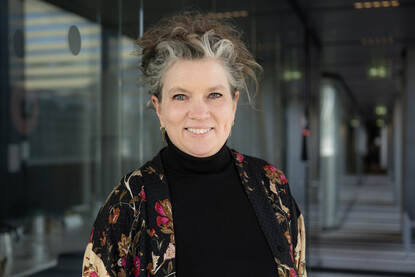Text Carmen Brinkman
Photo Josje Deekens
The Financial and Economic Affairs Department (FEZ) plays an important role in simplifying financial processes and frameworks, so they become easier for all involved. In close cooperation with staff who work in the financial domain and in policy implementation, the department’s Financial and Information Management Division (FEZ/FM) has taken major steps to simplify the forms required for assessing reports in the activity cycle. These forms are used when monitoring activities financed from programme funds. In 2024 Deputy Director of the Directorate-General for International Cooperation (DGIS) Steven Collet announced a competition aimed at reducing the administrative burden at DGIS. This led to FEZ/FM brainstorming lots of new ideas. The proposal to simplify the forms was one of the top three ideas, since it had the potential to significantly reduce workloads at both the ministry and the missions.
FEZ has taken major steps to simplify the forms required for assessing reports in the activity cycle.

‘The aim is to have forms that really support staff in making their assessment.'

From tick-box exercise to effective tool
When assessing reports, staff often have to answer many questions, some of which can be unclear. ‘The aim is to have forms that really support staff in making their assessment,’ says Monique van der Meijden, specialist senior policy officer at FEZ/FM. She’s keen to stress that the new forms must not be treated as an exercise in box-ticking: ‘Staff receive these reports, which they need to read and assess. An effective tool helps policy officers and financial officers determine whether the organisation in question is on track to achieve the agreed results on time and on budget. On the basis of this assessment, interim adjustments can be made if necessary, by making additional agreements with the organisation, for example. Taking the current requirements for reports as a basis, we want to work together with users to develop the best forms for this purpose.’
Rogier Marchand, senior policy officer at FEZ/FM, has been working with colleagues in the financial domain and policy staff from the Office of International Cooperation (BIS) to map out the process from start to finish. ‘We looked to see what questions were unnecessary or unclear,’ he explains. ‘Policy officers at BIS primarily looked at the content-related questions, while FEZ focused on the financial ones.’ After an intensive process involving feedback from controllers at both the missions and the ministry, financial advisers at the Financial Service Organisation (FSO) and staff involved in Monitoring, Evaluation and Learning, the improvements were made and then tested.

'It’s great to see that suggestions are actually leading to improvements.’
More focused and more efficient assessment
Jasper Kort, senior administrative officer for development cooperation in Dhaka, Bangladesh says the following: ‘Over the past year I’ve regularly submitted quality notes via BZelf when things have been unclear or when things on the page have seemed unnecessary. This meant I’ve frequently had contact with Rogier, who has always been very open to suggestions. It’s great to see that these suggestions are actually leading to improvements. Before, the questions were very generic and then further defined in a number of subsidiary questions. This meant you had to give long, potentially confusing answers. In the new forms, the questions are a lot more succinct and specific. For me, as a financial adviser, it means I can assess reports in a more targeted and efficient way and can give the controller a more comprehensive overview.’
Jasper rounds off by giving us even more insight. ‘BZ is well on the way to creating a more streamlined assessment process. There’s a lot to be gained from matching up the assessment criteria with the contractual reporting requirements. It’s our task as financial advisers and controllers to provide FEZ with input from day-to-day practice.’

Using IMPACT for a simpler process
The introduction of the new forms in IMPACT, the Information Management Platform for the Activity Cycle, represents a significant step forward. Monique explains: ‘When assessing reports, staff work in a number of systems: BZelf, 247Plaza, IMPACT and the Sophia archiving system. From January 2025, everything will happen in IMPACT. Since December 2024 it’s been possible to add tracked changes and comments in the HTML fields and forms in IMPACT, so staff can work on assessments together in a collaborative way. It's also now possible to add screenshots to help establish audit trails. The assessment forms were not put in IMPACT before these new features were in place.’
Monique says the next step is to look critically at the information BZ asks organisations for. ‘We ask for a lot of detailed information. If we can simplify this, it will benefit the assessment of reports. Sometimes we receive a huge number of pages.’ The aim is to make processes as straightforward and efficient as possible so that staff can do their work more easily.

Read more about the Financial and Economic Affairs Department (FEZ)
(Please note: the following links can be accessed by central government staff only)
Ongoing initiatives
FEZ is continually striving to simplify work processes, looking for solutions to streamline parameters, improve forms, increase knowledge and improve support through IMPACT. The fact that staff no longer have to carry out interim closures of prepayments is one example of how parameters have been simplified. FEZ/FM has also launched a project to make audit protocols easier to work with. And FEZ has raised the Organisational Risk and Integrity Assessment (ORIA) threshold from €1 million to €1.5 million, to reflect inflation over the past 10 years. In the context of Future-Proof BZ, the department will also be looking beyond the activity cycle for opportunities to simplify and streamline rules and monitoring in the period ahead.
Do you have a good idea to make financial processes and procedures more straightforward? If so, we’d like to hear it! Send your idea to FEZ@minbuza.nl.










